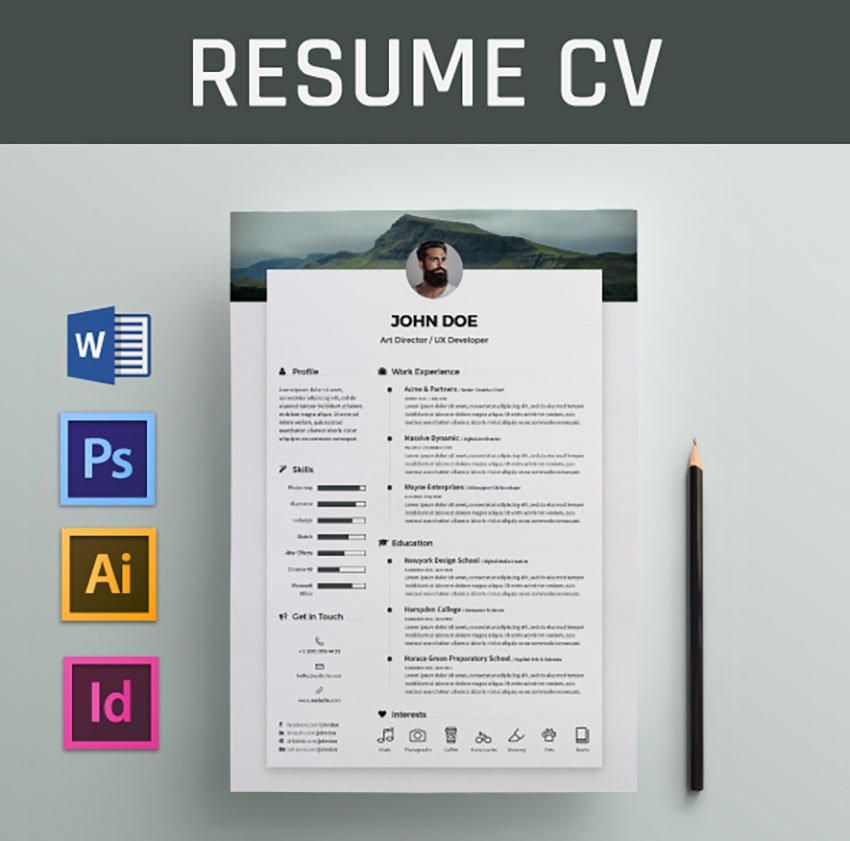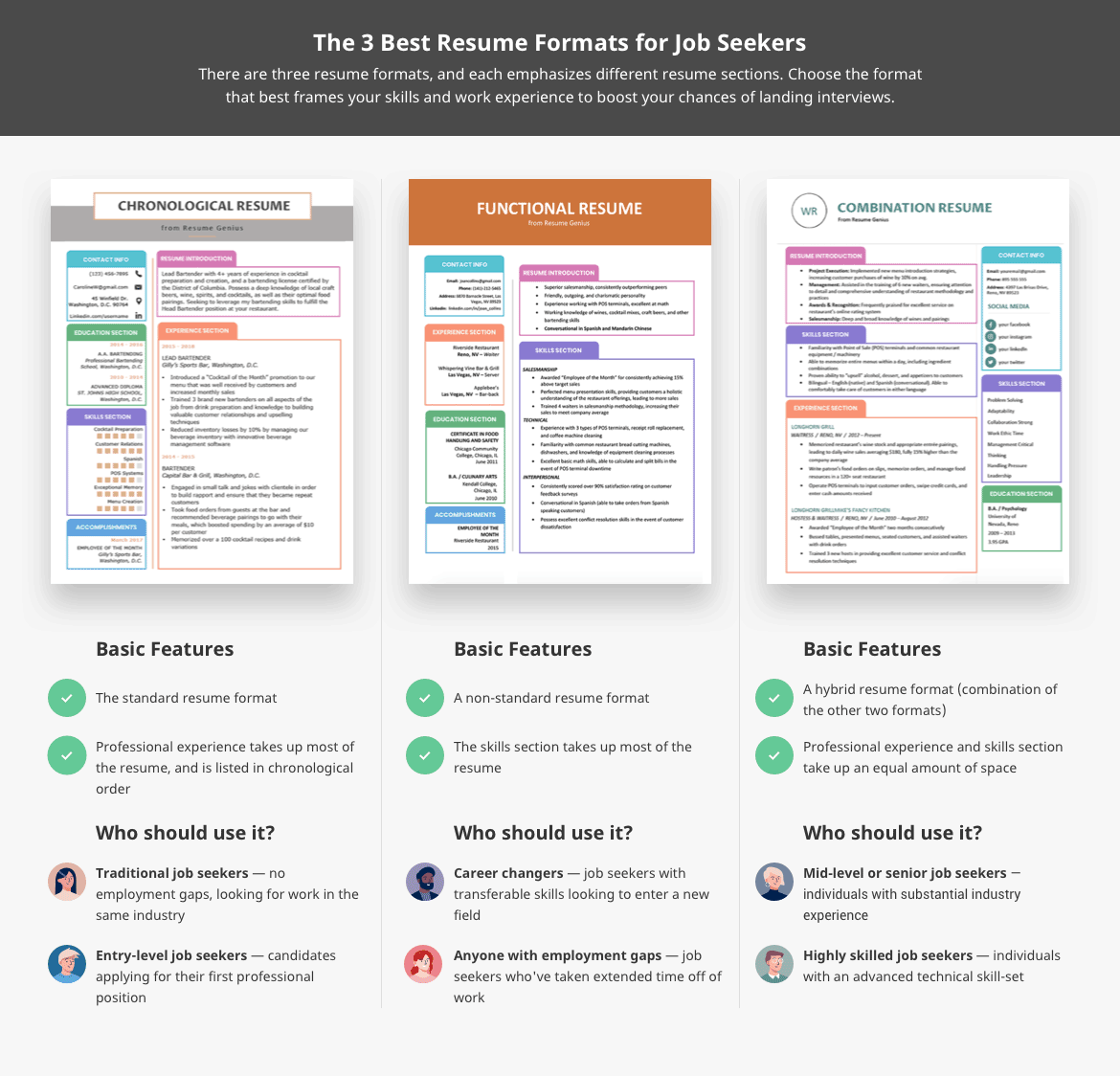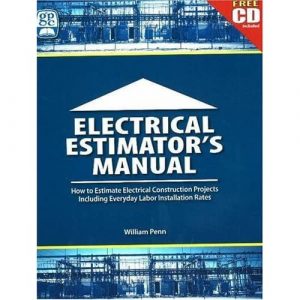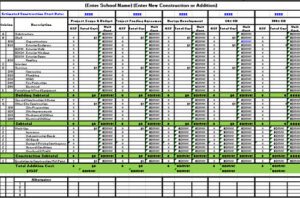
The 2021 Resume How to choose the right resume format
Writing a resume is hard enough without having to worry about formatting. So let us help. We’ll show you how to choose the best resume format for you — the format that best highlights your skills and experience and downplays any weaknesses.
These are the three most commonly used resume formats in 2021:
- Chronological (or “Reverse-Chronological”)
- Functional (or “Skills-based”)
- Combination (or “Hybrid”)

| 1. Chronological (for showcasing work experience) The chronological resume is the gold standard resume format, so we created an easy copy-paste outline for you to use. 1. Contact Information FIRST AND LAST NAME Email: youremail@gmail.com | Phone: 895 555 555 | Address: 4397 Aaron Smith Drive Harrisburg, PA 17101 | Linkedin: linkedin.com/in/yourprofile 2. Resume Introduction Expert [industry] professional with [# of years] years of experience. Seeking to leverage my qualifications in [relevant skills] to fill the [position name] position. A diligent worker looking to quickly take on more responsibility and help [Company Name] achieve its goals. 3. Work or Relevant Experience Most Recent Job Title Employer Name / Location / Start Date – End Date Include a bulleted list of your accomplishments Make sure you quantify (add numbers to) these bullet points Earlier Job Title Employer Name / Location / Start Date – End Date List relevant accomplishments from an earlier job If you no longer hold this job, make sure you use past tense verbs to describe your experience 4. Education Degree Name / Major University, Location | Start Date – End Date 5. Skills and Certifications List your relevant skills and certifications Include a range of hard skills and soft skills Be as specific as possible. Mention the actual names of software or tools you’re able to use 6. Additional Resume Section Here’s where you can add any other relevant information For example, this section could be for any of the following: publications, languages, volunteer experience, or relevant hobbies | |
| Download This CV |
Resume formatting tips
Although it’s your resume’s content that will get you interviews, you should still ensure your resume layout is neat and easy to read.
Here are five quick tips to correctly format your professional resume.
1. Left align the content
In general, you should left-align your resume. Unless your resume template was specifically designed with a different alignment, left is the standard, because it’s how people in the US are trained to read.
2. Keep your resume on one page
99% of the time, it’s best to only send out one-page resumes. That’s because one page is the standard resume length for most industries, and it allows hiring managers to quickly view your relevant qualifications.
However, there are some reasons to break this rule. For instance, you might need a two-page resume if:
- you have 10+ years of experience relevant to the job you want
- you’re writing a management level or executive resume
- you’re an academic writing a professional CV
- you’re applying for work in Europe and using a CV template
If you’re still unsure how long your resume should be, make it one page to be safe.
3. Use .63″ by 1″ margins
The correct margins for a resume are .63″ left/right and 1″ top/bottom. This combination strikes the perfect balance between making your resume easy to read, while including as much information as possible on a single page.
If you’re worried you have too much (or too little) information on your resume, you can tweak the margins as necessary. Just don’t get carried away, or you risk making your resume look unprofessional.
4. Use an HR-approved resume font
The font style and size you choose for your resume won’t improve your chances of getting the job, but they can definitely hurt your chances. If you choose a professional font at a readable font size, you’ll be okay.
Recommended fonts
- Book Antiqua
- Georgia
- Lato
- Trebuchet MS
- Arial Narrow
- Garamond
- Calibri
- Helvetica
- Cambria
Recommended font size:
While the best font for a resume is debatable, experts agree that font size shouldn’t fall below 10.5 or exceed 12.
However, some fonts look better smaller, and some fonts look better at larger sizes. Experiment until your resume looks professional and readable.
5. Save your resume as a PDF
PDF is the best file format to save your resume in. Saving your resume as a PDF ensures its formatting remains exactly how you want it, and that it’s easy for employers to open.
Additionally, the red spell-check underlines used by Microsoft Word don’t show up on your resume if it’s saved as a PDF, making it more visually appealing.
However, you should always check the job listing first for any instructions about how to send your resume.
For example, many bigger companies that use an applicant tracking system (ATS) to scan through resumes will tell applicants to send their resumes as a .docx file. That’s because ATS software has an easier time scanning Word Docs.
Download the Unique Template Pack for MS Word
Courtesy: resumegenius

